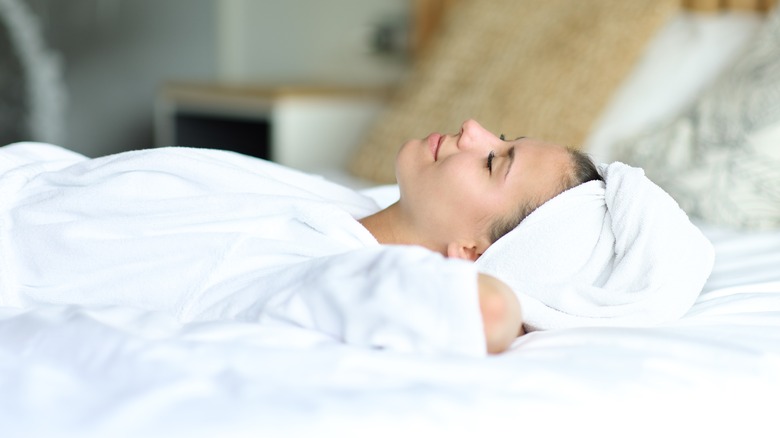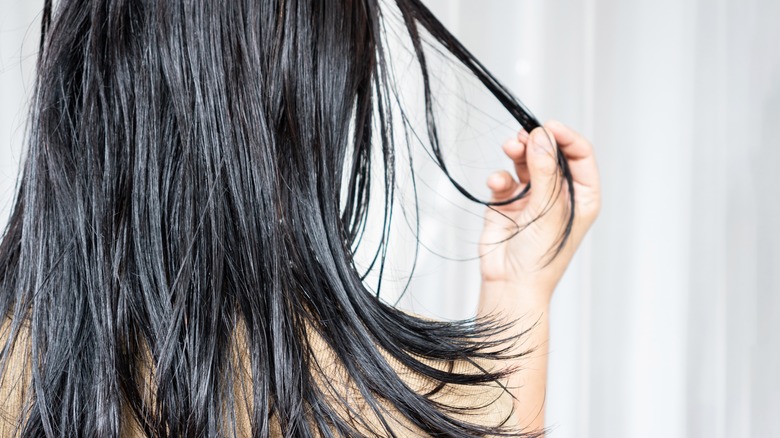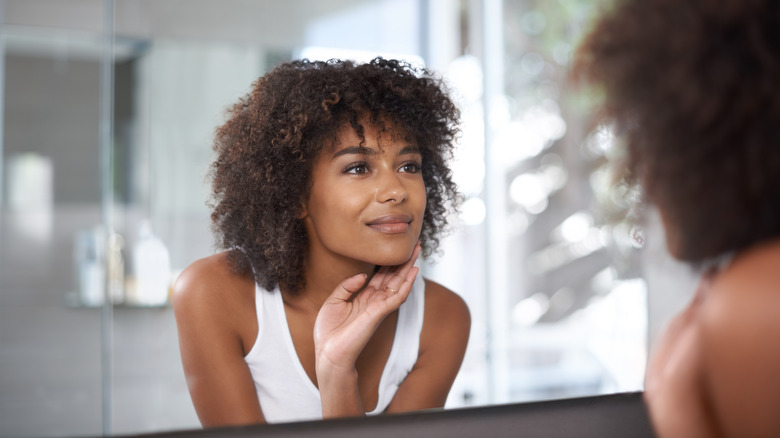Should You Use A Terrycloth Pillowcase If You Sleep With Wet Hair?
If you like sleeping with wet hair, you've probably heard a million reasons why you shouldn't do it. After all, wet hair is weaker than dry hair, so add tossing and turning in bed all night, and you'll most certainly wake up with a lot of breakage. Sleeping with wet locks can also damage hair follicles, causing more hair loss, as well as increase the risk for scalp infection. Your hair may also become dull from sleeping with it wet because your pillowcase actively absorbs your hair's natural oils when it dries throughout the night.
If you're a devoted night-showerer, sleeping with wet hair is sometimes inevitable, especially if you don't want to blow dry your hair into the wee hours of the morning. Thankfully, some people have discovered a possible solution: a terrycloth pillowcase. The special thick fabric slip is made of the same material as a soft towel, so that it absorbs moisture and dries it overnight. This way, you don't have to worry about staying up late to blow dry your hair. But, is it worth the hype?
Hair care and terrycloth
Whenever a new hair solution comes out, people jump to try it to see if it's really a miracle product. On the outside, a terry cloth pillowcase seems like a great solution for how to protect your hair while you sleep, mainly because of its absorbency qualities. It also eases the mind if you're worried about getting your pillow soaked when sleeping with wet hair, which can cause a build-up of nasty bacteria and mold.
However, there are some downsides. Although this pillow might work for those who frequently sleep with hair masks or hair oils, for people without these protectants, a terrycloth pillow case can cause breakage, split ends, and major frizz from the rubbing of hair on the ridges of the material. Furthermore, since terry cloth is so absorbent and helps to draw water from the hair, it also draws natural oils, leaving hair looking dry and feeling brittle.
When protecting hair from breakage, satin is by far a safer choice, as well as microfiber, which can offer similar absorbent elements, if that's what you're in the market for.
However, terrycloth isn't great for your skin
When sleeping on a pillow, chances are you're more concerned about the state of your hair than your skin. But, most of us don't lay flat on the back of our heads all night. In fact, according to Psychiatric Times, the average person moves 40-50 times a night. That's a lot of chances for your face to land on your pillow!
Unfortunately, terry cloth pillowcase can draw moisture out of the skin, leaving your face feeling dry, which can lead to flaking and acne. Dry skin can also make you look like you have more wrinkles than you do. Also, just like with hair, terry cloth can promote friction, wearing on your delicate skin throughout the night. Kseniya Kobets, MD, Director of Cosmetic Dermatology at Montefiore Advanced Care suggests using silk or bamboo cotton to protect both skin and hair (via Well + Good). In addition, she recommends avoiding sleeping with wet hair at all, as it can irritate the skin and cause and breakouts. It can also be harmful to put your face on a wet pillow if there is any bacteria or yeast growth. All in all, it's best to stick to dry hair at bedtime.


